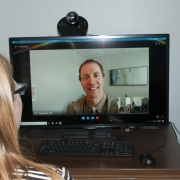Psychiatrist discusses telehealth and its post-pandemic future
By Joshua Roose, Cadillac News
Telehealth has become more important than ever during this pandemic, and few specialities of medicine are more amenable to this virtual alternative than psychiatry.
Dr. Paula Colombo, a psychiatrist with Munson Healthcare and Northern Lakes Community Mental Health Authority (NLCMHA), said she was using telehealth well before the current pandemic forced its widespread implementation. “Everybody essentially pivoted to telehealth as soon as the pandemic started,” she said. “We’ve done telehealth for over ten years.” NLCMHA has physical locations in Cadillac, Traverse City, Houghton Lake, and Grayling, and Colombo said that telehealth has enabled NLCMHA to better serve its patients spread across six counties.
“This really allows us to serve people more easily, and it’s much more patient-centered,” Colombo said. “The psychiatrist is in one location and can serve multiple locations within the same day if needed. This allows for more flexible and at times urgent appointment scheduling. Before telehealth, a patient could only be scheduled for an appointment the days the physician was on-site at the clinic.”
In addition to making mental health services more accessible to rural areas, Colombo said that there are many other advantages to telehealth, such as much lower “no show” rates, elimination of transportation challenges, more convenient rescheduling, and a greater sense of openness from patients when they are in the comfort of their home. Yet, despite these benefits, telehealth has its limitations as well. Even in psychiatry, where there is greater emphasis on physician-patient dialogue than other specialties, the best option is still an old-fashioned visit to the doctor’s office.
“I don’t think you’ll talk to any clinician who would say it’s ideal,” Colombo said. “I think most of us would much prefer to see people in-person.” Colombo said the reason in-person visits are preferable is the many subtleties missed via phone or video chat, and those subtle cues from facial expression and body language are very important in psychiatry. “There are nuances of people’s physicality that are going to be missed on a phone call without a doubt, but also sometimes on a video chat,” Colombo said. “It’s not preferred. It’s like talking to anybody on the phone; it’s way better to see somebody in-person. You don’t have all those nuances.”
Colombo said she thinks that telehealth will be adopted more widely after the pandemic, but it will likely be an adjunct means of care, not a replacement. Specifics about how telehealth will be used will also be influenced by how insurance companies decide to compensate physicians. “I think most mental health people would say that they would like to see a hybrid moving forward,” Colombo said. “I think everybody’s hand sort of will be forced based on what insurance allows us to do and not do, and we’re probably going to know a lot more in the next couple months.”
Moving forward, Colombo said she thinks this hybrid approach will make mental health services more accessible and convenient for patients and physicians. If anything good comes out of this pandemic, it may be that telehealth has had the chance to gain wider acceptance. “The COVID-19 pandemic in some ways has been a good thing for the concept of telehealth,” Colombo said. “I think it has allowed it to expand much more rapidly than it would have without the pandemic. I think in the long run that’s going to be a good thing for patients.”


